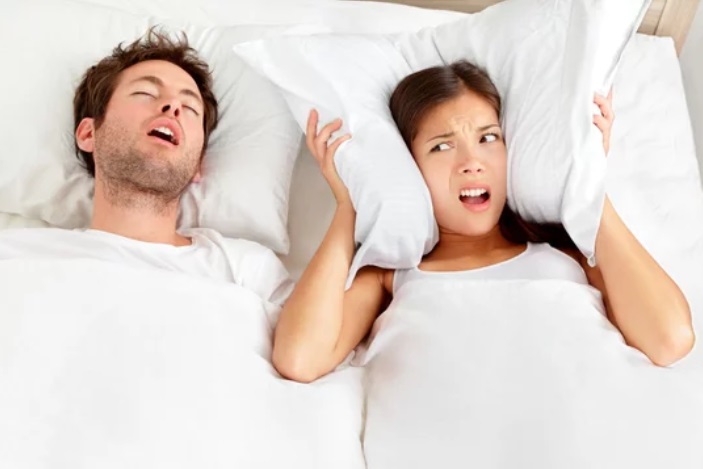Snoring affects millions globally, causing disruptions not only for the person snoring but also for their family members and partners.
This condition can arise due to several factors, including nasal congestion, poor sleeping posture, being overweight, or anatomical issues.
As awareness around sleep health has grown, numerous innovative anti-snoring devices have been introduced to help reduce or eliminate snoring.
In this blog, we’ll take a close look at some of the most popular anti-snoring devices, tools, and equipment available today.
What Causes SNORING?

Before we dive into the various solutions, it’s essential to understand the root causes of snoring.
Snoring occurs when airflow through the mouth and nose becomes partially blocked, creating vibrations in the soft tissues of the throat that produce sound.
Common causes of snoring include:
- Blocked Nasal Airways: Conditions like allergies, colds, or sinus infections can cause airway blockages.
- Poor Muscle Tone: When the muscles in the throat and tongue relax too much, they can obstruct the airway.
- Bulky Throat Tissue: Extra tissue in the throat, often from being overweight, can lead to snoring.
- Long Soft Palate and Uvula: Certain anatomical features can narrow the airway, increasing the likelihood of snoring.
- Sleeping Position: Lying on your back can worsen snoring as gravity causes the throat muscles to collapse more easily.
Understanding these causes can help in choosing the right anti-snoring device to address specific issues.
Now, let’s explore the range of anti-snoring solutions available.
1. Nasal Strips and Dilators
How They Work:
Nasal strips and dilators are among the simplest and most accessible snoring aids.
Nasal strips are adhesive strips placed on the bridge of the nose, which help open up the nasal passages.

Nasal dilators, on the other hand, are inserted into the nostrils to keep them open.
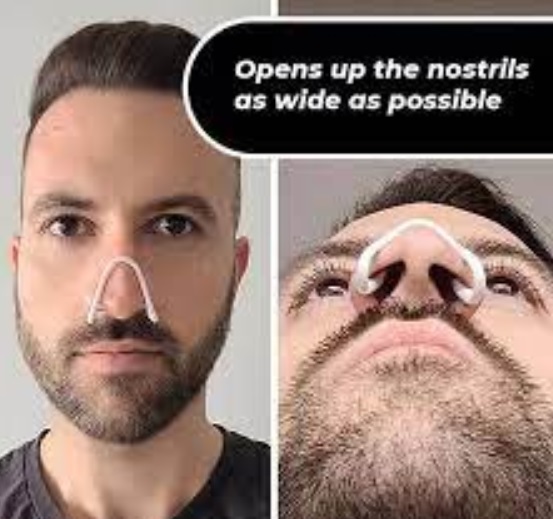
Currently, a Magnetic nasal dilator device is also becoming viral which also serves the purpose of dilating the collapsed structure of the nose.
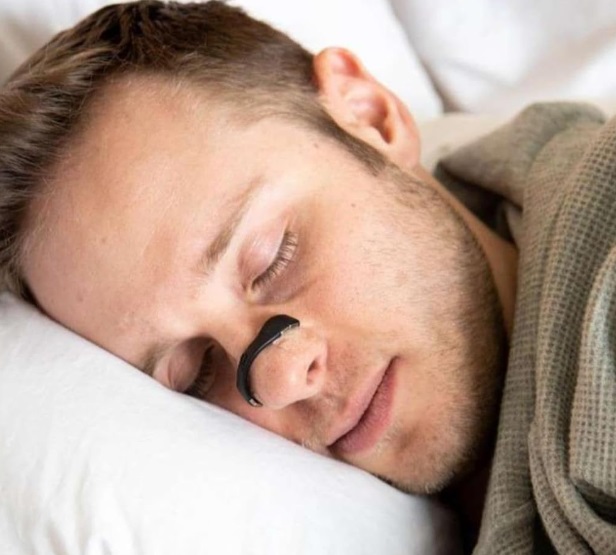
Benefits:
- Easy to use and non-invasive.
- Improve airflow through the nasal passages.
- Effective for individuals with nasal congestion or allergies.
2. Nasal Clips
Nasal clips are small, non-invasive devices designed to reduce snoring by improving airflow through the nasal passages. They typically work by gently widening or lifting the nostrils, allowing for smoother breathing while you sleep. This helps prevent the nasal passages from collapsing or becoming obstructed, which can contribute to snoring.
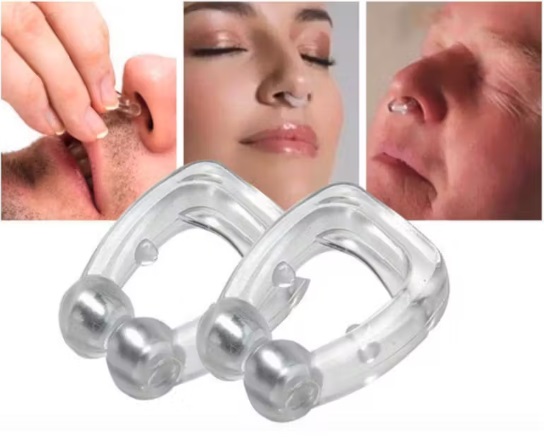
How They Work:
- Open the Nasal Passages: Nasal clips are worn by placing them at the entrance of the nostrils. They use gentle pressure to widen the nostrils slightly, which improves airflow.
- Reduce Mouth Breathing: When nasal breathing is unrestricted, you’re less likely to breathe through your mouth, which can reduce vibrations in the soft tissues at the back of the throat (a common cause of snoring).
Benefits:
- Non-Invasive and Easy to Use: Nasal clips are often lightweight and comfortable, making them a convenient, non-invasive solution for many people who experience nasal-related snoring.
- Ideal for Nasal Congestion or Narrow Passages: Nasal clips are particularly helpful for people whose snoring is related to nasal congestion, a deviated septum, or naturally narrow nasal passages.
Nasal clips can be effective for many snorers, and they work best for individuals whose snoring originates primarily from the nasal area.
3. Mandibular Advancement Devices (MADs)
How They Work:
Mandibular advancement devices (MADs) are worn inside the mouth and work by gently advancing the lower jaw, which helps keep the airway open and reduces snoring vibrations.

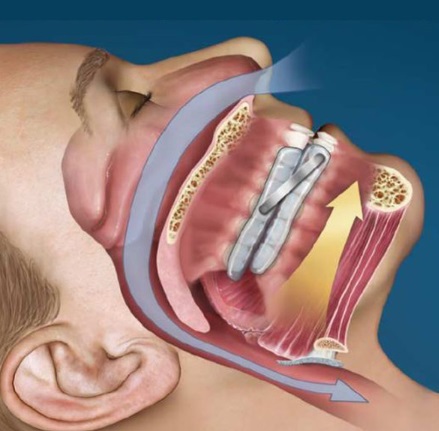
Benefits:
- It can be customized by dental professionals for a comfortable fit.
- Particularly effective for individuals with mild sleep apnea.
- Comfortable for long-term use once properly adjusted.
4. Tongue Stabilizing Devices (TSDs)
How They Work:
Tongue stabilizing devices (TSDs) hold the tongue in a forward position to prevent it from blocking the airway.
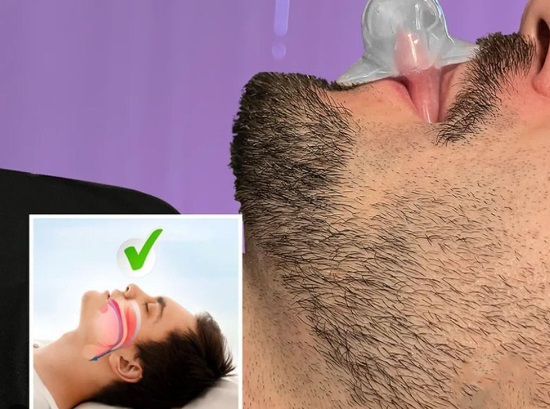

Benefits:
- Simple design that doesn’t require repositioning the jaw.
- Beneficial for individuals with large tongues or unique anatomical features.
- Often recommended for people with dentures who may not be able to use MADs.
5. Anti-Snoring Chin Straps
How They Work:
Anti-snoring chin straps fit around the head and help keep the jaw closed during sleep, preventing the mouth from opening and reducing mouth breathing.

Benefits:
- Non-invasive and easy to use.
- Effectively reduces mouth snoring.
- Affordable and widely accessible.
6. Continuous Positive Airway Pressure (CPAP) Devices
How They Work:
CPAP machines are commonly used for moderate to severe cases of snoring related to sleep apnea. These devices deliver a constant stream of air through a mask to keep the airways open throughout the night.

Benefits:
- Recognized as one of the most effective treatments for sleep apnea.
- Customizable pressure settings to suit individual needs.
- Improves overall sleep quality and reduces daytime fatigue.
7. Anti-Snoring Pillows
How They Work:
Anti-snoring pillows are designed to position the head and neck to reduce airway obstruction, often encouraging a side-sleeping position that can reduce snoring.
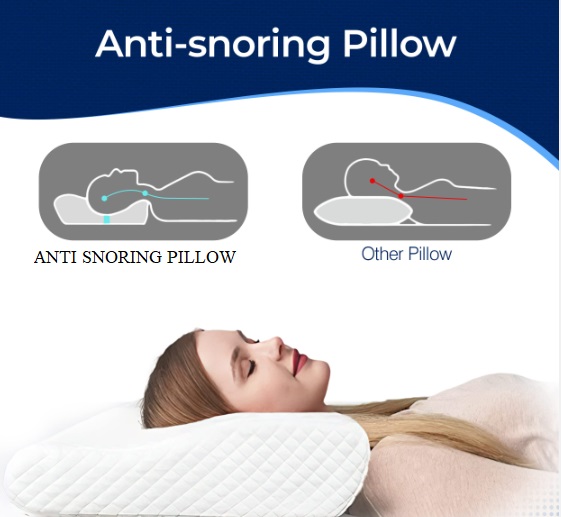
Benefits:
- Naturally, it improves sleep posture.
- Comfortable to incorporate into a nightly routine.
- Complements other anti-snoring solutions.
8. Smart Anti-Snoring Devices
How They Work:
Smart anti-snoring devices use technology to detect snoring sounds and gently encourage the sleeper to shift position
OR
The smart device detects snoring and, through high-precision sensors, massages the HYPOGLOSSAL NERVE and jaw muscles through different frequency vibration pulses to promote muscle tightening.
Some are wearable as neckbands, while others work with smartphone apps or other wearable tech.


Benefits:
- Non-invasive with minimal sleep disruption.
- Automatically responds to snoring without manual intervention.
- Tracks sleep quality, helping users understand snoring patterns better.
9. Essential Oils and Nasal Sprays
How They Work:
Essential oils such as peppermint, eucalyptus, and tea tree, along with nasal sprays, can help alleviate nasal congestion. These natural products can clear blockages in the nasal passages, reducing airway restrictions that contribute to snoring.
Benefits:
- Non-invasive and easy to use.
- Can be combined with other anti-snoring devices for greater effectiveness.
- Suitable for people with nasal congestion due to colds or allergies.
10. Throat Exercises and Sleep Apps
How They Work:
Studies have shown that specific throat exercises can strengthen the muscles in the throat, helping to reduce snoring.
Various apps provide guided exercises that users can follow at home.
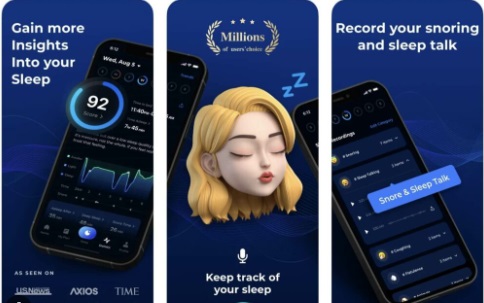
Benefits:
- Completely non-invasive and affordable.
- Helps strengthen throat muscles naturally.
- Provides long-term results when practiced consistently.
Conclusion
While snoring might seem like a minor inconvenience, it can lead to more serious health issues and disrupt relationships.
With the wide range of anti-snoring devices, tools, and equipment available, there’s a suitable option for almost every individual dealing with this issue.
From simple nasal strips and chin straps to advanced CPAP machines and even surgical procedures, each solution addresses specific causes of snoring.
Consulting with a healthcare professional can help you select the most effective device, especially if snoring is related to conditions like sleep apnea.
Often, a combination of lifestyle adjustments, anti-snoring devices, and sometimes medical intervention can provide a more restful night for both the snorer and those around them.
THANK YOU
MEDICAL ADVICE DISCLAIMER:
This blog, including information, content, references, and opinions, is for informational purposes only.
The Author does not provide any medical advice on this platform.
Viewing, accessing, or reading this blog does not establish any doctor-patient relationship.
The information in this blog does not replace the services and opinions of a qualified medical professional who examines you and prescribes medicines.
If you have any questions of a medical nature, please refer to your doctor or qualified medical personnel for evaluation and management at a clinic/hospital near you.
